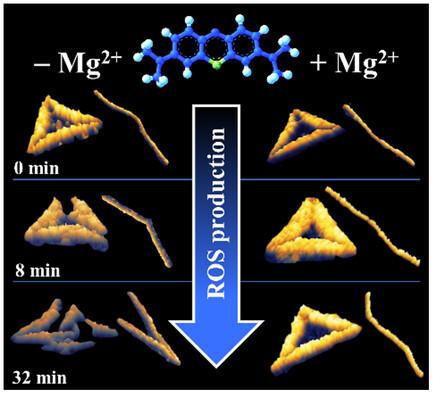Ion-Dependent Stability of DNA Origami Nanostructures in the Presence of Photo-Generated Reactive Oxygen Species
引用次数: 0
Abstract
DNA origami nanostructures are promising carries for drug delivery applications. However, their limited stability under relevant conditions often presents a challenge. Herein, the structural stability of DNA origami nanostructures is investigated in a setting compatible with their application in photodynamic therapy (PDT). To this end, DNA origami triangles and six-helix bundles (6HBs) are loaded with the clinically tested photosensitizer methylene blue, which upon irradiation with red light generates reactive oxygen species (ROS) that attack the DNA origami nanostructures. ROS-induced structural damage is observed to depend on the ionic composition of the surrounding medium and becomes more severe at low ionic strength. Mg2+ ions can efficiently protect the DNA origami nanostructures from ROS-induced damage and may even heal some of the damage obtained under Mg2+-free conditions when added after irradiation. Finally, the employed DNA origami 6HBs are more resistant toward ROS-induced structural damage than the triangles, which is attributed to their markedly different mechanical properties. These results thus provide some fundamental insights into the stabilizing role of DNA origami superstructure that may guide the selection or design of DNA origami nanocarriers with optimized stability for their application in PDT.

DNA 折纸纳米结构在光产生的活性氧作用下的稳定性与离子有关
DNA 折纸纳米结构是很有前途的药物输送应用载体。然而,它们在相关条件下有限的稳定性往往是一个挑战。在此,我们研究了DNA折纸纳米结构在光动力疗法(PDT)应用环境下的结构稳定性。为此,在 DNA 折纸三角形和六螺旋束(6HB)中加入了临床测试过的光敏剂亚甲基蓝,亚甲基蓝在红光照射下会产生活性氧(ROS),攻击 DNA 折纸纳米结构。据观察,ROS 引发的结构破坏取决于周围介质的离子成分,在离子强度较低时破坏更为严重。Mg2+ 离子可以有效地保护 DNA 折纸纳米结构免受 ROS 诱导的破坏,甚至在辐照后加入 Mg2+ 离子还可以修复一些在无 Mg2+ 条件下产生的破坏。最后,所采用的 DNA 折纸 6HB 比三角形更能抵抗 ROS 引起的结构损伤,这归因于它们明显不同的机械性能。因此,这些结果为DNA折纸上层结构的稳定作用提供了一些基本见解,可指导选择或设计具有最佳稳定性的DNA折纸纳米载体,以应用于光导治疗。
本文章由计算机程序翻译,如有差异,请以英文原文为准。
求助全文
约1分钟内获得全文
求助全文

 求助内容:
求助内容: 应助结果提醒方式:
应助结果提醒方式:


